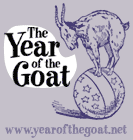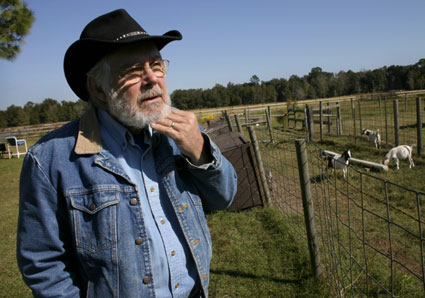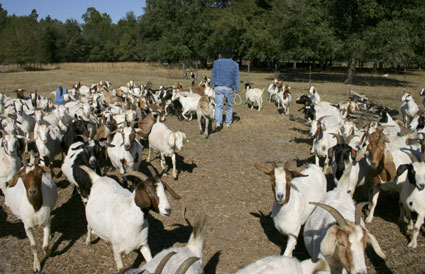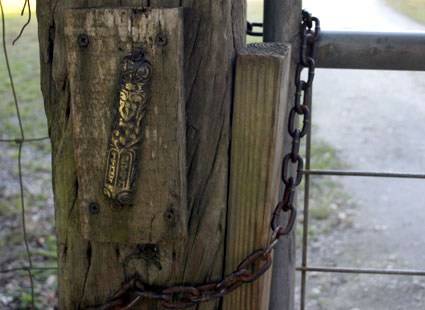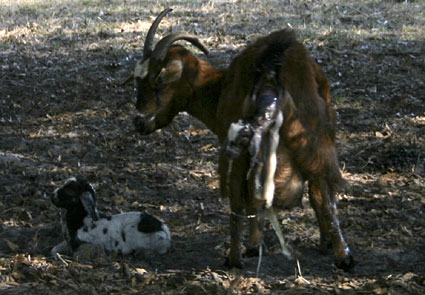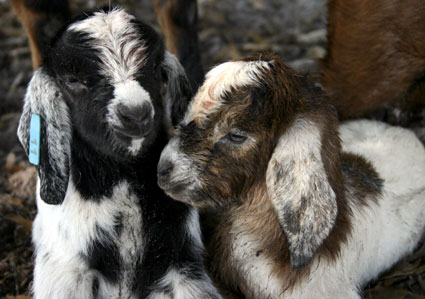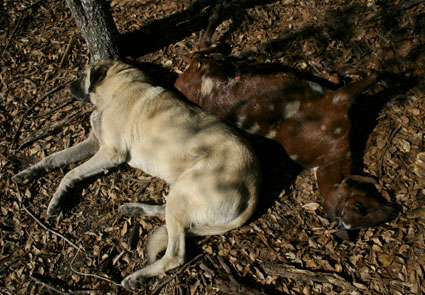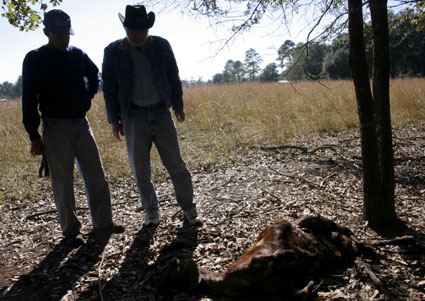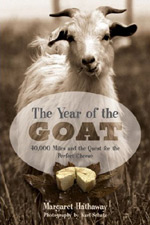When we pulled in front of his house, Larry came out to meet us, apologizing in advance that he might be moving a little slowly because prostate cancer that had been in remission had come back, and just this week he'd finished a round of radiation therapy. For the last year, as he's been focusing on his health, he's turned over much of the herd management for his three hundred goats to Ronald Cordero, a young Venezuelan man who lives with his wife and baby in one of the out buildings. Though Ronald was a graphic designer in Venezuela, he's quickly getting a feel for goats, and when Larry took us out to find him, Ronald was methodically trimming hooves in the buck pasture.
Though Ronald is a relatively inexperienced goatherd, Larry trusts him with the care of his animals. One reason for this is that the men share a religious faith, and actually became acquainted through their congregation, Beit Yisrael. Their belief is in the totality of the Bible, and the congregation follows the Old Testament as closely as the New (though, since they take it as a whole, they reject the terms "Old" and "New"). Thus, Larry and Ronald keep kosher, post the mezuzah on their door frames, observe the Sabbath on Saturday, pray in Hebrew, and celebrate the Jewish holidays as prescribed in Leviticus, such as Passover and Sukkot. Yet they also believe that Christ is the Messiah.
As Larry showed us his farm and we spoke about the land and his religious beliefs, he and Ronald continued to perform the day's work. Several does were due to kid, and while Ronald got feed ready for most of the animals, Larry went into the pasture to check on one goat who had isolated herself from the hungry herd. We were waiting by the fence when Larry began shouting for us to come into the pasture.
When we arrived, we found one kid lying on the ground under its mother, and another poking out of her, its hooves and head hanging below her tail. With one final push, the kid slid out in a gush of afterbirth and immediately the mother, a red Spanish doe with one curled horn, began to lick her baby and nibble the sandy placenta from its head. Gradually she cleaned them up, and the two Boer-cross kids--one black and white, the other red and white--began to wobble and squawk, tumbling over each other and craning their necks to find their mama's teats.
Karl and I had never been present at a birth. It was overwhelming, truly a miracle that these little animals came out, their translucent hooves and downy fur perfect from the very beginning. In the same pasture, two kids that had been born earlier in the morning were snuggled by themselves in some tall grass while their mother stood a ways off, expelling the last bloody strings of afterbirth. Larry explained that some mothers immediately took to their kids, cleaning and hovering protectively over them, while others were distracted by feed or shade. One Nubian doe named Gingerbread, who had been with the herd for nearly a decade and was due in the next few days, had last year killed both of her kids when she accidentally rolled on top of them.
As he told us about Gingerbread, Larry began to look around for her. Ronald had fed the herd and was putting tags in the ears of the new kids when Larry asked if he'd seen Gingerbread. They agreed that it wasn't like her to miss a meal, and the two men began to call her name. Ronald went to look for her, following the tree line around the perimeter of the pasture, his blue "Osmosis Jones" cap bobbing as he began to run. The hat dipped out of sight and a second later Larry's cell phone started to ring; Gingerbread was dead, attacked in a corner of the pasture where the goats have lately been sleeping.
We rushed over to the goat and found Ronald supporting her head as he looked at the injuries. Gingerbread's organs were hanging out of a hole in her belly. At first, Larry suspected that Hami, a new Anatolian shepherd, was the culprit; apparently, Hami had been chasing goats and nipping at their legs the last few days. When Hami came over to the body, though, it was clear that he hadn't done it. He nosed at her organs, licked them a little, and then curled up next to the body, as though he were trying to protect it even when he knew he'd failed. It was heartbreaking to watch.
Larry walked around the field, staring at the ground and poking parts of the fence. Based on paw prints in the sand near a loose flap of the wire fencing, and on a limp that he'd noticed this morning in Hami's back leg, he decided that Gingerbread's attacker must have been a coyote. Hami fought it, but the predator had escaped.
This was not the first time that a goat had been lost. Earlier in the day, Larry had told us a story about an eleven foot alligator that came onto the property and grabbed a goat while it drank from a pond. It had looked almost like the goat was swimming as she flailed around back and forth, screaming until the alligator finally dragged her under water. Birds of prey, too, had begun to hover around kidding season, waiting on fence posts for an animal small enough to carry.
What was especially sad about Gingerbread's loss was that within her, there were two more little lives that were also taken. Having just watched a birth, it was terrible to see that potential being destroyed; I kept wanting them to say that the babies could be salvaged, but, of course, they could not.
The Book of Job reads: "The Lord gave, and the Lord hath taken away; blessed be the name of the Lord." Throughout the afternoon we spent with Larry Krech, I kept casting him in my mind as a Job. Afflicted by a cancer, a pregnant animal killed, he kept reminding us of the miracle of existence, of the newborn kids, and of the land. Through the day's joys and trials, he returned to his faith, to praise the wonders of the world even while grieving for a loss. While I don't share all of his beliefs, I admire their strength. And I hope that he, as Job, is ultimately blessed with prosperity, longevity, and peace. —MMH
Post Script: Karl & Margaret Reunite Old Air Force Buddies
After we left Kevuda we followed Larry's directions and drove about 20 miles northeast to Lake Griffin State Park to camp for the night. When we arrived, there were police cars in parking lot (we later found out they were assisting a child welfare officer in a truancy matter). Braving the police presence, we made it in by the skin of our teeth; another 10 minutes and the ranger would be closing the park. We found the campsite, pitched our tent, and went in search of the bathrooms. Outside the bathroom a little old man in baggy clothes sat waiting in the dark for his laundry to dry. While I was in the bathroom, Margaret, waiting with Godfrey, struck up a conversation. His name was Charlie Hancock, and he was from Indiana. Margaret told him we were down from Maine, and he said that he once had served in Japan in the Air Force with a buddy from Maine. I was coming out of the bathroom, and asked where in Maine his buddy was from. He couldn't remember where, just that the guy's name was Kip Fletcher. That's strange, I said. My dad's business partner of 30 years happened to be named Cliff Fletcher, and he has a son named Kip. "Oh, that's right," said Charlie Hancock, "We called him Kip, but I believe his name was Clifton M. Fletcher."
I was pretty sure we were talking about the same Cliff Fletcher, but just to be sure I grabbed my cell phone and called my Dad. Sure enough, Cliff's full name was Clifton M. Fletcher and he had been in the Air Force in Japan. I got Cliff's phone number in Maine, dialed, and went back to find Charlie Hancock near the dryers. I told Cliff that we were calling from a state park in Florida, and it seemed we had found an old Air Force buddy of his. I handed the phone to Charlie Hancock and they talked for a good 10 or 15 minutes, filling each other in on where their lives had taken them in the past 50 years: work, children, grandchildren, retirement, travels. They reminisced about their old buddy Smitty down in Texas, and then brought up the names of the other boys they had served with all those years ago. When Charlie Hancock finally handed me back the phone there were tears streaming down his cheeks. The last time he had seen or talked to Cliff was when Cliff had thrown him a going away party. That was in 1957.
It was an amazing feeling to be responsible for reuniting Charlie Hancock and Kip Fletcher after all those years. It was like living one of those awful Hallmark Christmas specials or episodes of Touched by an Angel, that still brings a tear to your eye. Of course, almost as amazing as the small world encounter was how many things had to fall into place to put us in that state park at that time. If we had gotten to the park 10 minutes later, if we'd turned away from the park at the sight of the police, if we'd told Charlie Hancock we were from New York instead of Maine, or if we hadn't had to go to the bathroom, their reunion would have been prevented.
We found Charlie Hancock the next day, said good-bye, he thanked us again, and we wished him well. I know it's cheesy, but I really hope that sometime soon Charlie will take his motor home and make the trip from Indiana to Maine and see Cliff again. I think that'd be nice. —KGS
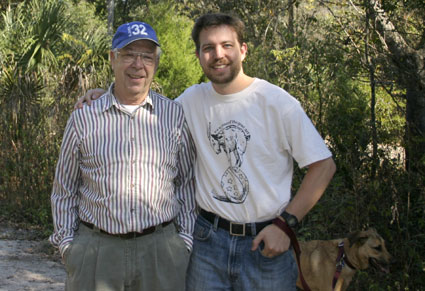 |
| Charlie Hancock and Karl in Lake Griffin State Park in Central Florida |
